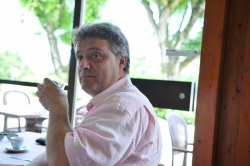You are here
Quantum Monte Carlo and Configuration Interaction for infinite solids (M.Caffarel)
Friday 26 November 2021, 14:00
 Michel Caffarel
Michel Caffarel
In this talk I present some recent work on computing total electronic energies for realistic solids. The standard approaches of the field are DFT and MBPT (GW/BSE). Here, we propose to use Configuration Interaction (CI) and quantum Monte Carlo (QMC). Our ultimate goal is to devise a method capable of treating strongly correlated solids (typically, transition metal oxides) for which DFT and MBPT theories fail. Multi-reference effects being important for these systems, a multi-determinant representation of the wavefunction is required.
A simple protocol in which both exact and approximate results for finite supercells are used to extrapolate to the thermodynamic limit is introduced. This approach is illustrated in the case of the carbon diamond using Slater-Jastrow trial wavefunctions including up to one million Slater determinants. Fixed-node DMC energies obtained with such large expansions are much improved, and the fixed-node error is found to decrease monotonically and smoothly as a function of the number of determinants in the trial wavefunction, a property opening the way to a better control of this error. The cohesive energy extrapolated to the thermodynamic limit is in close agreement with the estimated experimental value. Some preliminary results on transition metal oxides are also presented.
References:
- A. Benali, K. Gasperich, K.D. Jordan, T. Applencourt, Y. Luo, M.C. Bennett, J.T. Krogel, L. Shulenburger, P.R.C. Kent, P-F. Loos, A. Scemama, and M. Caffarel, Toward a systematic improvement of the fixed-node approximation in diffusion Monte Carlo for solids: A case study in diamond J. Chem. Phys. 153, 184111 (2020)
- F.D Malone, A. Benali, M.A. Morales, M. Caffarel, P.R.C. Kent, and L. Shulenburger Systematic comparison and cross-validation of fixed-node diffusion Monte Carlo and phaseless auxiliary-field quantum Monte Carlo in solids, Phys. Rev. B 102, 161104 (2020)
Please, find here the recording of the webinar.
